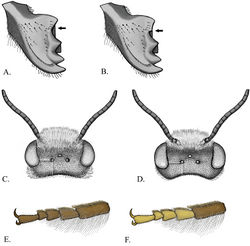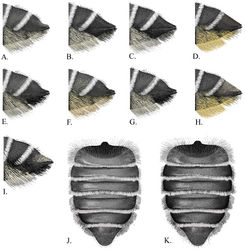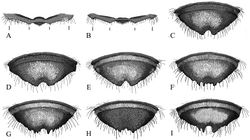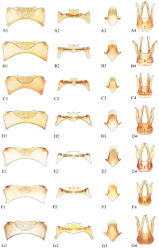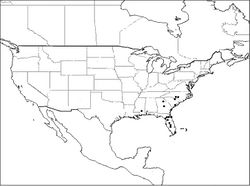Difference between revisions of "Megachile pseudobrevis"
m (Imported from ZooKeys) |
m (1 revision) |
(No difference)
| |
Latest revision as of 15:30, 13 September 2012
| Notice: | This page is derived from the original publication listed below, whose author(s) should always be credited. Further contributors may edit and improve the content of this page and, consequently, need to be credited as well (see page history). Any assessment of factual correctness requires a careful review of the original article as well as of subsequent contributions.
If you are uncertain whether your planned contribution is correct or not, we suggest that you use the associated discussion page instead of editing the page directly. This page should be cited as follows (rationale):
Citation formats to copy and paste
BibTeX: @article{Bzdyk2012ZooKeys221, RIS/ Endnote: TY - JOUR Wikipedia/ Citizendium: <ref name="Bzdyk2012ZooKeys221">{{Citation See also the citation download page at the journal. |
Ordo: Hymenoptera
Familia: Megachilidae
Genus: Megachile
Name
Megachile pseudobrevis Mitchell, 1934 – Wikispecies link – Pensoft Profile
- Megachile brevis pseudobrevis Mitchell, 1934 Holotype female, USA: Florida (NCSU).
Diagnosis
Megachile pseudobrevis closely resembles Megachile brevis and Megachile onobrychidis. The differences between Megachile pseudobrevis and Megachile brevis are slight. Female Megachile pseudobrevis has less black appressed pubescence on T6 than Megachile brevis. Also the scopa of Megachile pseudobrevis has less black setae than Megachile onobrychidis, with black setae being restricted to S6. Megachile pseudobrevis has more black setae than Megachile brevis, which has often only a few black setae apically on S6.
Female. Body length9–11 mm. Mandible 4-toothed, with no angulation between teeth 3 and 4 (Figure 4A). T2-3 with deep transverse basal groove, T4 with shallow basal groove. T1-5 with apical fringes of white hair covering marginal zone; T1-2 with medially interrupted fringes of white hair. T1 with white discal pubescence; T2 discal pubescence white basally, black apically; T3-5 with black discal pubescence. T6 convex basally and concave apically in profile, concave laterally in dorsal view; with black erect setae basally and black appressed pubescence. S1-5 with ivory setae; S6 with black setae (Figure 5G).
Male. Body length7–9 mm. Mandible 3-toothed.Ocellocular distance equal to ocelloccipital distance (Figure 4D). T5 with complete apical fringe of white hair covering marginal zone. T6 with tomentum; transverse carina variable in shape, usually with indistinct medial notch and asymmetrical jagged projections; true apical margin with submedial teeth closer to lateral teeth than each other (Figure 6B). Genitalia and hidden sterna resemble those of Megachile brevis (Figures 7A1–A4).
Distribution of material examined
USA: Florida: Alachua, Duval, Monroe and Orange Counties (Mar.-Sep.); 14 females, 16 males.
Ecology
Packer (1987)[1] observed Megachile pseudobrevis nesting in tufts of grass, creating nests of single cells. Megachile pseudobrevis preferred the commonest flowering plant Bidens pilosa (Asteraceae) at the site as a source for cutting nesting material, but also used petals from Eustoma exaltatum (Gentianaceae).Nests were parasitized by the meloid beetle Nemognatha punctulata LeConte (Packer 1987[1]).
Flower records
Balduina angustifolia (Asteraceae), Bidens pilosa (Asteraceae), Eriogonum tomentosum (Polygonaceae), Eustoma exaltatum (Gentianaceae), Lupinus cumulicola (Fabaceae), Vitex agnus castus (Verbenaceae).
Comments
Megachile pseudobrevis was originally described as a variety of Megachile brevis. It was raised to species level by Sheffield et al. (2011)[2]. This species has a limited range occurring in the southeastern United States (Figure 15).
Taxon Treatment
- Bzdyk, E; 2012: A revision of the Megachile subgenus Litomegachile Mitchell with an illustrated key and description of a new species (Hymenoptera, Megachilidae, Megachilini) ZooKeys, 221: 31-61. doi
Other References
- ↑ 1.0 1.1 Packer L (1987) The triungulin larva of Nemognatha (Pauronemognatha) punctulata LeConte (Coleoptera: Meloidae) with a description of the nest of its host-Megachile brevis pseudobrevis Say (Hymenoptera: Megachilidae). Journal of the Kansas Entomological Society 60: 280-287.
- ↑ Sheffield C, Ratti C, Packer L, Griswold T (2011) Leafcutter and Mason Bees of the Genus Megachile Latreille (Hymenoptera: Megachilidae) in Canada and Alaska. Canadian Journal of Arthropod Identification 18. doi: 10.3752/cjai.2011.18.
Images
|
